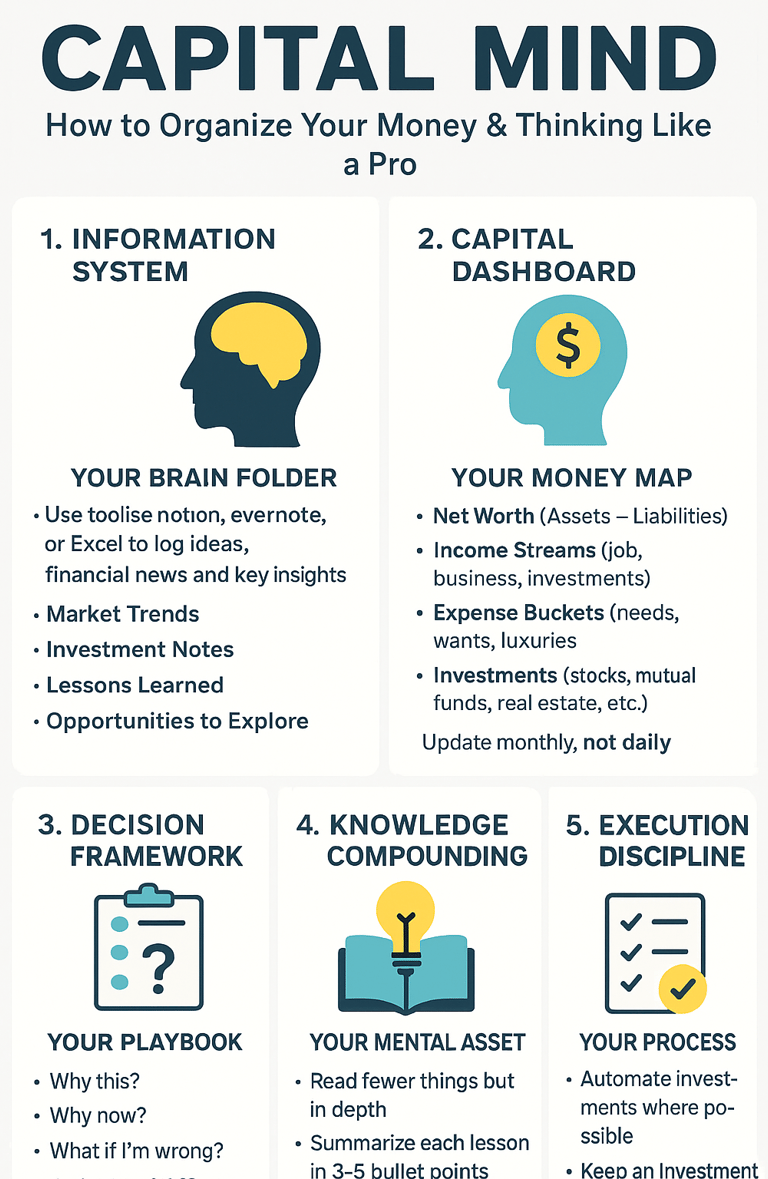“Capital Mind: How to Organize Your Money & Thinking Like a Pro”
Discover how to build a "Capital Mind"—a professional system to organize money, decisions, and financial growth. Learn principles, tools, and steps to think like a pro investor.
RAVINDRA PRAJAPATI (EDUCATIONAL BLOG)
10/3/20252 min read
Introduction: Why a Capital Mind Matters
In today’s chaotic financial world, most people are busy earning and spending—but very few know how to think about money like a professional. That’s where the idea of a Capital Mind comes in.
A Capital Mind is more than just saving or investing. It’s about building a mental framework and organizational system that helps you manage money with clarity, discipline, and long-term vision. Imagine running your personal wealth like a business—where every rupee has a purpose, and every decision follows a playbook.
What is a Capital Mind?
At its core, a Capital Mind is a mindset that treats money as a resource to be managed, not just spent. It blends two key elements:
Capital → Your money, time, and resources.
Mind → Your clarity, habits, and decision-making process.
When combined, they form a disciplined system that helps you analyze, allocate, and compound wealth over time.
The Core Principles of a Capital Mind
To think like a pro, you need principles. Here are the non-negotiables:
Clarity – Know where you stand financially at all times.
Structure – Keep a system for tracking and reviewing.
Patience – Focus on compounding, not quick wins.
Adaptability – Adjust to market shifts without panic.
Risk Awareness – Protect downside before chasing upside.
How to Organize Your Capital Mind Like a Pro
1. Information System (Your Brain Folder)
Pros don’t rely on memory. They document.
Use tools like Notion, Evernote, or Excel.
Categorize into: Market Trends, Investment Notes, Lessons Learned, Ideas to Explore.
2. Capital Dashboard (Your Money Map)
Build a simple dashboard that shows:
Net Worth = Assets – Liabilities
Income Streams = job, business, side hustles
Expense Buckets = needs, wants, luxuries
Investments = stocks, funds, real estate
>> Update monthly—not daily. Professionals don’t get lost in noise.
3. Decision Framework (Your Playbook)
Before making financial moves, ask:
Why this?
Why now?
What if I’m wrong?
Create a checklist for risk %, time horizon, and diversification. The pro rule: say NO more than YES.
4. Knowledge Compounding
Your mind compounds faster than money.
Read fewer things, but deeply.
Summarize lessons in 3-5 points.
Review monthly to spot patterns.
5. Execution Discipline
Wealth is built on boring consistency.
Automate investments.
Keep an investment journal.
Set quarterly reviews, not emotional reactions.
The Pro Analogy: Treat Yourself as a Business
Think of yourself as the fund manager of “You Capital Pvt Ltd.”
Salary = Revenue
Savings = Profit Margin
Investments = Reinvested Profits
Habits & Learning = R&D
A Capital Mind means you’re not just a spender—you’re the CEO of your money.
Final Thoughts:
A Capital Mind is not about making more money instantly. It’s about thinking clearly, structuring your finances, and organizing decisions like a professional.
Once you start treating your personal wealth like a business—with dashboards, playbooks, and reviews—you stop being a spectator and start being a capital strategist.
Your money deserves a CEO. And that CEO is you.
Key Tags:
Finance, Wealth Management, Investing, Financial Literacy, Money Habits.


RAVINDRA PRAJAPATI, Not a sebi registered
FOLLOW Us
ravindra.prajapati1122@gmail.com
+91 9795187745
© 2025. PiPiFinTech All rights reserved.
Contact Us
ABOUT Us
Our mission is to empower you to maximize every single penny and best solution for wealth generation and management for every mature age group.
Product TOPICS
Digital E-Wealth Platform
Mutual Funds
Education Planning
Insurance
FD and Bonds
Retirement Planning
Wealth Creation
(Disclaimers : Mutual Fund investments are subject to market risks, please read scheme related documents carefully.)
